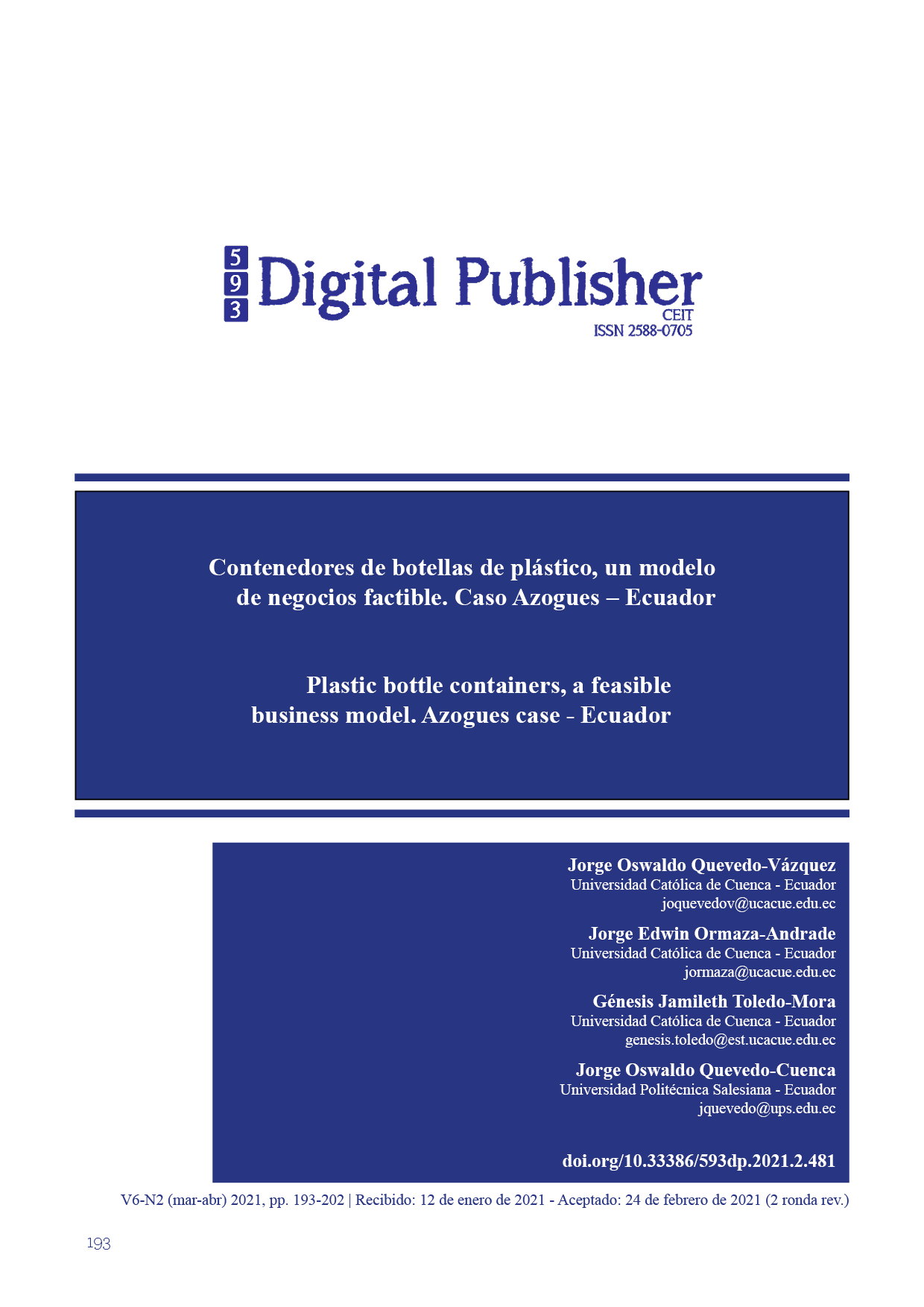Plastic bottle containers, a feasible business model. Azogues case - Ecuador
Main Article Content
Abstract
The objective of this research document is to propose a feasibility business plan for plastic bottle containers, which encourages recycling in the inhabitants of the city of Azogues, Province of Cañar, which has the identification and development of pertinent studies to learn about the culture of recycling that citizens have, as well as to establish the possibility, feasibility and acceptance of incorporating recycling machines for plastic bottles in the city. The methodological setting of the research was non-experimental, with a mixed approach; With an exploratory - descriptive scope, the deductive - inductive method was used as the main method. The results of the article show that, in Azo-gues, its inhabitants consider recycling as one of the activities they carry out regularly since they are part of human and environmental health; however, in the city, there is no automated service; that is, a recycling machine where people can deposit their plastic bottles and receive in return an incentive that encourages even more environmental care; Likewise, the possibility of success of the project is demonstrated by having an IRR of 47% and a NPV of $ 516,031.17.
Downloads
Article Details

This work is licensed under a Creative Commons Attribution-NonCommercial-ShareAlike 4.0 International License.
1. Derechos de autor
Las obras que se publican en 593 Digital Publisher CEIT están sujetas a los siguientes términos:
1.1. 593 Digital Publisher CEIT, conserva los derechos patrimoniales (copyright) de las obras publicadas, favorece y permite la reutilización de las mismas bajo la licencia Licencia Creative Commons 4.0 de Reconocimiento-NoComercial-CompartirIgual 4.0, por lo cual se pueden copiar, usar, difundir, transmitir y exponer públicamente, siempre que:
1.1.a. Se cite la autoría y fuente original de su publicación (revista, editorial, URL).
1.1.b. No se usen para fines comerciales u onerosos.
1.1.c. Se mencione la existencia y especificaciones de esta licencia de uso.
References
Berenguer Húngaro, Mónica y Trista Moncada, José J. y Deas Yero, Douglas (2006). El reciclaje, la industria del futuro. Ciencia en su PC, (3),. ISSN: 1027-2887. Disponible en: https://www.redalyc.org/articulo.oa?id=1813/181322792005
Bermejo, M., & De la Vega, I. (2003). Crea tu propia empresa. Estrategias para su puesta en marcha y supervivencia. Madrid: McGraw-Hill.
Coreaga, J. A (1993). Manejo y reciclaje de los residuos de envases y embalajes. México: Instituto Nacional de Ecología.
Leopold, L.B. et. al. (1973). A procedure for Evaluating Enviromental Impact. US Department of the Interior. USA: Gov. Print. Office.
Mariatti, Alejandro (2009). Metamorfosis laboral y reciclaje. Revista Katálysis, 12 (1), 94-104. Disponible en: https://www.redalyc.org/articulo.oa?id=1796/179613969012
Mutis, Juliana y Ricart, Joan Enric (2008). Innovación en modelos de negocio: La Base de la Pirámide como campo de experimentación. Universia Business Review, (18), 10-27. ISSN: 1698-5117. Disponible en: https://www.redalyc.org/articulo.oa?id=433/43301802Naranjo, A. S. (2015). La inflación y el ingreso de los recolectores de desechos sólidos inorgánicos reciclables de la ciudad de Guayaquil. Redalyc, 75.
Ormaza Andrade, Jorge, Ochoa Crespo Juan, Ramírez Valarezo Fabián y Quevedo Vázquez, Jorge (2020). Responsabilidad social empresarial en el Ecuador: Abordaje desde la Agenda 2030 . SAPIENTIAE: Revista de Ciencias Sociales (Ve) XXVI(3), Disponible en: https://www.redalyc.org/jatsRepo/280/28063519009/movil/index.html
Pellegrini Blanco, Nila C. y Reyes Gil, Rosa E. (2009). Reciclaje de papel en la Universidad Simón Bolívar. Revista de Investigación, (67), 45-57. ISSN: 0798-0329. Disponible en: https://www.redalyc.org/articulo.oa?id=3761/376140382003
Quevedo Vázquez, Jorge Oswaldo, & Giler Escandón, Lesi Vanessa, & Álvarez Vera, Manuel Salvador, & Ormaza Andrade, Jorge Edwin (2020). Viabilidad financiera en la producción de Microorganismos benéficos para el tratamiento de Residuos orgánicos: caso Azogues – Ecuador . SAPIENTIAE: Revista de Ciencias Sociais, Humanas e Engenharias, 6(1),97-108. ISSN: 2183-5063. Disponible en: https://www.redalyc.org/articulo.oa?id=5727/572763612009
Ramos Ascue, Juan Diego y Quispe, Wilfredo Baldeón. Análisis de riesgos de la seguridad e higiene ocupacional durante el manejo de residuos sólidos y reciclaje de plástico polietileno. Rev. P+L [online]. 2017, vol.12, n.1, pp.63-71. ISSN 1909-0455. http://dx.doi.org/10.22507/pml.v12n1a6.González Martínez, A. C. (2001). Costos y beneficios ambientales del reciclaje en México. Gaceta Ecológica, 11.
Salazar Hornig, Eduardo y Ruiz Fuentealba, Nelson (2009). Modelo ACO para la recolección de residuos por contenedores. Ingeniare. Revista Chilena de Ingeniería, 17 (2), 236-243. ISSN: 0718-3291. Disponible en: https://www.redalyc.org/articulo.oa?id=772/77211359012Licera, H. (2007). Torre solar con botellas de gaseosa. Redalyc, 2.
Sanmartín Ramón, G.S., Zhigue Luna, R.A., y Alaña Castillo, T. P. (2017). El reciclaje: un nicho de innovación y emprendimiento con enfoque ambientalista. Universidad y Sociedad [seriada en línea], 9 (1), pp. 36-40. Recuperado de http://rus.ucf.edu.cu/
Weimberguer, K. (2009). Plan de Negocios. Herramienta para evaluar la viabilidad de un negocio. Lima: USAID.

